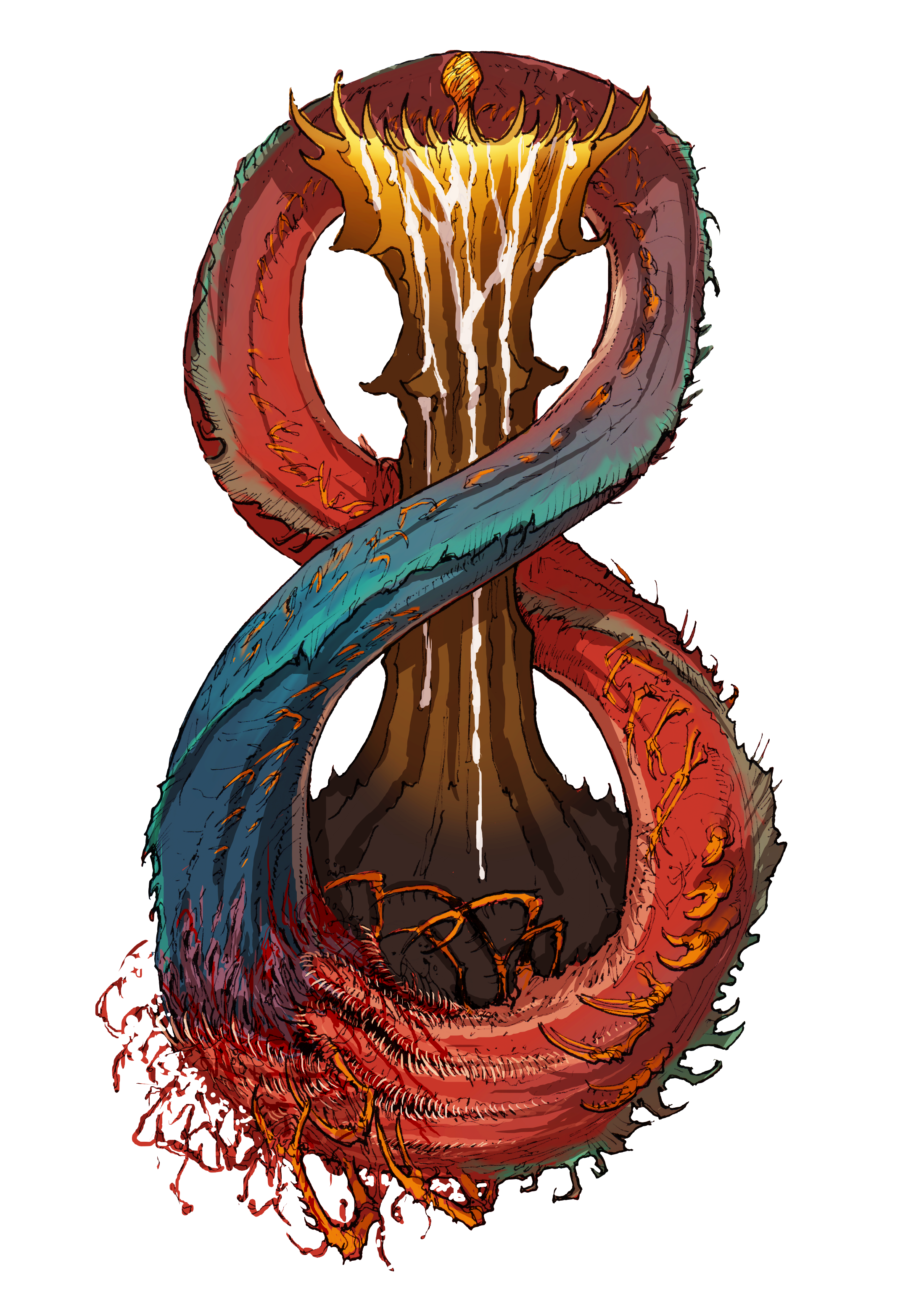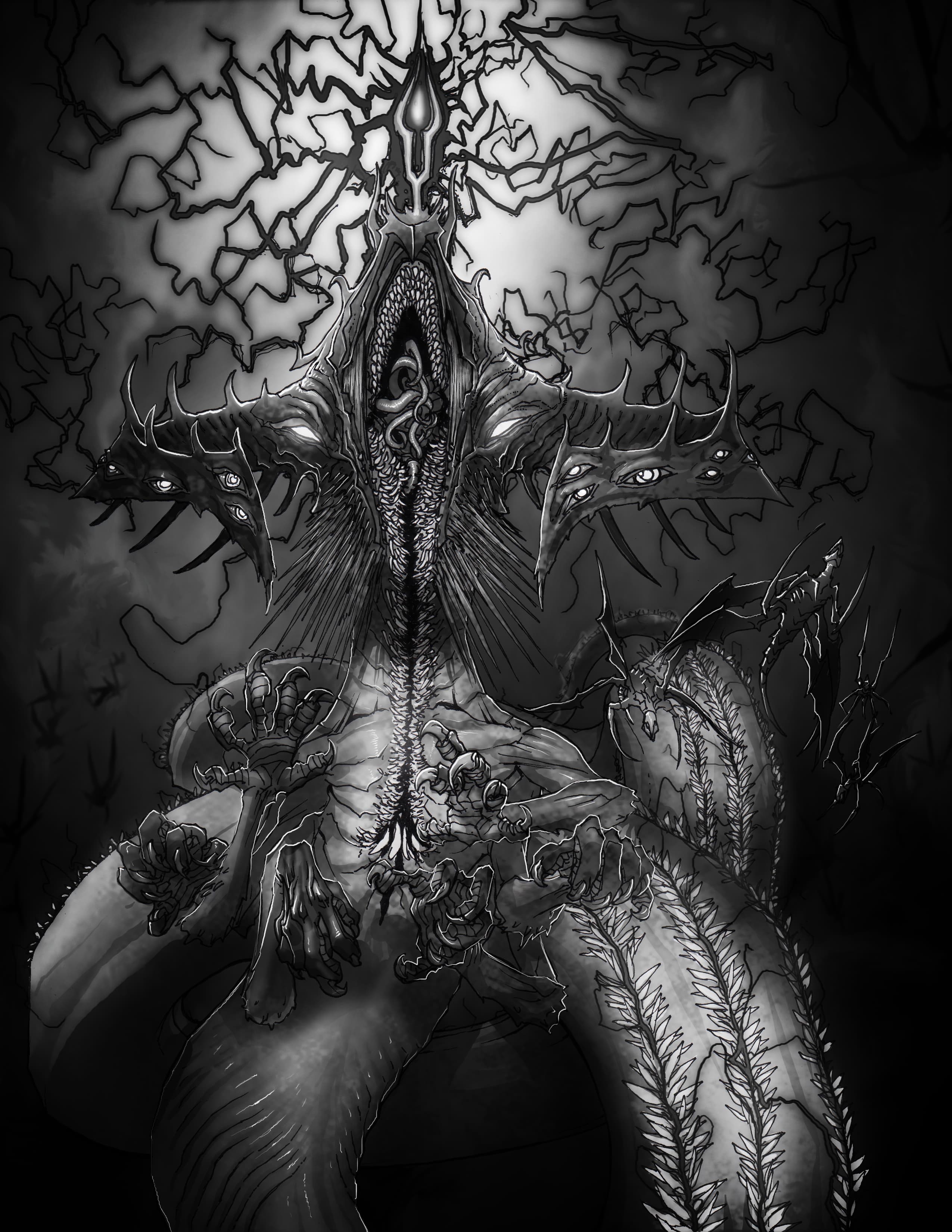

Revolution is such an appealing concept when the world grows stagnate. A little spice to add flavor to a boring dish. How many lives have been lost in the name of causes we don’t believe in anymore? Yes, those who forget the past are condemned to repeat it. Think about it. You could learn so much by studying the gods. At the dawn of time, Xerxes started a revolution and the war that followed rages on without end. Would he have revolted if he knew the consequences? Would you? How different would your answers be, I wonder? After all, you’re not immortal, are you?
Xerxes could feel the call, that stiffening of the arterial lining, that swaying of lateral hairs beneath his neck scraping the collar bone; the drought was almost over.
There was some time left, a few short days before the crimson kiss. What better time to celebrate? He beat the tiny silver wings along his spine, filling the empty spaces with fluid and a crackling blue light. There was a charge in the air, a buildup of energy making the needles in his skull vibrate and the tip of his pronged nose snap.
Just one touch, that’s all it took. Xerxes lowered the tip of his nose close to the epithelial lining of the hive. Suddenly, a bright arc of volatile energy zipped from his pointed snout, causing the halls to convulse. A soft blue light now emanated from the roof, illuminating hundreds of vats filled with a boiling red liquid.
He dipped one of his talons into the hissing soup, bulky, clumsy, and hard to rotate. These hands were not meant to shape, not meant to elongate the bones, shorten the trachea, or stitch the kidneys. No, he had another set of hands for that.
Under crooked scales, between plates in his skull and through the cracks in splintered nails, came a hundred fingers. These appendages were fragile, an extension of his true self, an ancient porous light freed from the throat of the Great Devourer.
Xerxes was an engineer, but not just any engineer. He was the heir apparent, the first victor of the Pallid Wars, and one of the three greater names.
That is why his vibriatus clung so tight. That pink flesh looping through the pours in his soul and tying him in place. He couldn’t leave now, not without significant effort. He was too accustomed to this body and it to him. As it should be, he spent so much time in selection, after all.
At the beginning of the last Pallid War, when the nameless killed each other for the right to carry their names, Xerxes scrutinized each contender.
This body was too small.
This body was too big.
This body had one chipped tooth and was missing its left eye.
Weak, desperate, ignorant, and soft. One by one, he rejected them, tossing them back as scraps for lesser names.
Xerxes wouldn’t settle, and so the war of succession continued until, finally, he found the right one. There amongst the gnashing of teeth and claw was a bleached skull with crooked scales, a daunting mane, and a twisted spine. It wasn’t the fastest, nor the strongest, but the glove fit just right.
From the Devourer’s throat, Xerxes descended like a radiant cobweb, ensnaring the nameless creature. There was no struggle; in fact, the vessel embraced him, tissue quivering as the skull opened and tendrils spilled forth, hooking him in place. The engineer’s dense white light was gathered up and sealed within, sparks of his radiance still visible in the vibriatus’s milky white eyes.
He tested his fingers, touched his toes, and licked his teeth. This body was perfect, and soon silver wings sprouted along his spine, and a split, hollow nose rose out of his skull.
Xerxes was born again.
He and his vibriatus claimed victory in the last war, driving the chitinous crown into his spine and breaking open the white throne.
Drip, drip.
How could he forget such a taste? That golden nectar, thick and sweat, stuck to his teeth and rolled down his throat. Even now, he scraped the roof of his palate to find even the tiniest of crumbs. Solidified chunks of amber cut his throat but eased the pain in his belly.
Xerxes’s tongue rolled in a sea of mucous. Oh, how he wished to have another taste, just one more.
But he was going to have to win this war first.
Dipping the fragile digits of an engineer into the boiling vats of red fluid, Xerxes stirred the pot, cupping the liquid between his fingers.
At first, the crimson solution flowed between the cracks in his palm, but applying pressure gave it form. It was like clay now, slick, sticky, and soft. Xerxes stretched the substance, giving it strength by curling the edges and shaping bundled fibers.
The harpy was his design, sleek and agile, with stiff antennae and rigid spines.
Wings were the easiest to shape. Xerxes pulled the crimson fluid until it was so thin he could see straight through. The tips of his leftmost fingers were like picks pinching the thin sheets into enclosed membranes for easier blood flow.
The antennae were next, and that was the tricky part—a calcified internal stem with a brittle coat of gelatinous tissue and coarse twitching hairs. The consistency had to be just right.
Too thick in the middle, and the antennae wouldn’t bend.
Too generous with the coating, and the tissue wouldn’t conduct.
Too many hairs along the stem, and the energy dispersed at a wide-angle, disrupting distance, accuracy, and precision.
Xerxes didn’t always get it right, and his failures made up the vanguard. They were the gnats, annoying pests that nipped at his enemy’s toes and kept their eyes focused west while he came east.
He shaped the bodies last. Shoulders, ribcages, hips, and femurs didn’t require the same level of nuance. The body was just the base where everything else fit; A thoracic cavity for an eighteen-chamber heart, a peritoneal cavity for a gray liver, and reversed kidneys pumping cyanide into sacks along the harpy’s gills. There was always an empty space nearest the diaphragm; that’s where the stomach was supposed to go. Xerxes left that tissue out.
His harpies wouldn’t live longer than a week. The eldriatus were notoriously ephemeral without a stomach. Yet, that was a risk he accepted. All engineers learned early on that removing the stomach was necessary for proper control.
Soon the hive’s walls were pulsing with milky white sacks. His eldriatus, his larvae would mature in a single day, red skin turning dark brown and wings silver gray.
With a forked tongue, he tasted the walls of his kiln; warm, moist, and salty with a hint of rust. There wasn’t enough iron. Peeling back the scales nearest his wrist, he cut open the tissue and let his blood run down the halls. The hive soaked up the moisture like arid soil in a storm, turning the floor reddish brown.
There, that was just enough to ensure the wings came out sturdy and not too soft. Balancing the kiln for proper growth was something the lesser names always forgot to do.
Xerxes used every drop of the red rain depleting his stores until the chamber was nothing but a room of empty bowls. Not to worry, he felt an itch along his collarbone once more.
Scratch, scratch.
The rigid hairs now tapped along his eardrum, and his fingers were heavy and hard to curl. The rainy season was coming, and with the monsoon, a victor would be crowned.
Another twelve hours and his larvae would rip through the walls and lick the dew from their wings. They were already changing colors, spinning in their caskets, crimson hearts visible through translucent ribs.
Xerxes stretched his wings, climbing outside through the opening in the roof of his hive. He had the perfect view of the tonsil, pale blue light swaying in the distance.
He built his catacombs upon the ceiling of the Overworld, closest to the stem of the tonsil. His mother’s soft palate was like velvet between his fingers, a far cry from the stony crags and tar-filled pools beneath him.
Up there, he could practically reach out and touch the throne, but that wouldn’t do him any good. The petals won’t open, but for the last engineer standing. By that time, the tonsil will have descended so far from the roof that it will touch the hard palate below. Even now, it was partway to the bottom.
There was danger in being so close to the Pallid Throne. Xerxes felt it in his gut, a rising tide that threatened to drown him. Bonding to vessels of flesh helped contain their appetites and shirk off their mother’s embrace, but, sometimes, it wasn’t enough.
Drip, drip.
His stomach growled.

How many engineers had already died? He was responsible for at least four deaths; Portavius, who couldn’t see two feet above his head. Nelgramma, who took on four at once but was ignorant of the fifth. Cutane, who stretched her army too thin and couldn’t swim, and Belfray, a cut above the rest but whose reach was two feet too short.
From the west came a horde still dripping wet, arms and legs as soft as clay, not enough time in incubation. From the east, he heard the whimpers of a doll’s last breath as her eldriatus collapsed from starvation, shaped too late to be of use.
Xerxes sighed. It was no fun picking wings off flies.
Where was the real challenge? Where were the ancient names who knew the sounds of battle and the feel of clay between their fingers? Where was the rat king?
Only a skirmish with the primordial ones would prepare his appetites for the throne, not these skirmishes, these tea parties.
He lifted his head, knocking calcified salt from his eyes. The plains of Kath’le Kal were awake with the sounds of battle. The coming storms made the engineers bold, but none of the current squabbles interested him.
Of course, Icarus wouldn’t be there. He had no weather sense, no hairs on the inside of his collarbone. Engineers only ever shaped before or after the rains, but not Icarus. No, he was always late to the party waiting for the sounds of battle to tip him off. Hiding was his best course of action.
Or was it?
What was that scent in the wind? Not quite sweet, not quite sour, but something in between. It had a metallic taste and burned the back of his throat. This was the scent of an engineer, a powerful engineer.
Could it be? Had Icarus made a mistake and surfaced too early?
Xerxes beat the walls of his hive as the first of his harpies cut through the soft tissue and spilled out onto the floor.
Today wouldn’t be boring after all.
“Hun, hungry!” the eldriatus cried out, clawing at their throats.
Xerxes overwrote their minds, wrapping a luminescent thread between their conscience and his own.
“Wake up, children,” he said. “It’s time for a rat hunt.”